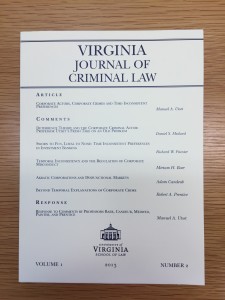 Date of Publication: Spring 2013
Date of Publication: Spring 2013
Articles:
Manuel A. Utset, Corporate Actors, Corporate Crimes and Time-Inconsistent Preferences
Find on Westlaw
Introduction: Corporations can be held criminally accountable for the actions of its agents–the board of directors, officers, lower-level employees, and majority or controlling shareholders (“corporate actors”). Moreover, a corporate actor may violate the law directly or vicariously through the actions of other corporate actors. This article is primarily concerned with unlawful behavior by corporations and corporate actors (collectively, ““corporate criminal misconduct”) under Federal statutes, such as the securities laws, financial regulations, and environmental law. In particular, it examines how our understanding of corporate criminal misconduct would change if one allows for the possibility that corporate actors exhibit time-inconsistent (“TI”) preferences. In doing so, this article extends to the problem of corporate criminal misconduct the more general theory of TI misconduct that I have developed elsewhere. . . .
Daniel S. Medwed, Deterrence Theory and the Corporate Criminal Actor: Professor Utset’s Fresh Take on an Old Problem
Find on Westlaw
Introduction: Deterrence is a core theory underlying much of American criminal law. It is based on the assumption that potential criminal transgressors are rational– that they act to maximize benefits and minimize costs in utilitarian terms. Traditional deterrence theory holds that setting criminal sanctions at sufficient levels will dissuade many aspiring violators from following through. But, as Professor Utset and others have noted, people are not entirely rational actors; human behavior is affected by a range of cognitive biases and psychological impediments that can produce less than optimal decision-making. . . .
Richard W. Painter, Sworn to Fun, Loyal to None: Time Inconsistent Preferences in Investment Banking
Find on Westlaw
Introduction: “Sworn to Fun, Loyal to None” was the slogan on a popular T-shirt in the 1970’s. Parents put up with the T-shirts, and similar attire, but worried about fleeting sexual encounters, drugs and other irrational risks younger people took with their lives. Some young people got in trouble with the law, usually for controlled substances, civil disobedience and other relatively minor offenses. Short term thinking was a psychological trait many people associated with immaturity, whether or not there was credible empirical evidence of an inverse correlation between this cognitive bias and age. . . .
Miriam H. Baer, Temporal Inconsistency and the Regulation of Corporate Misconduct
Find on Westlaw
Introduction: Manuel Utset does us a great service by applying the theory of time-inconsistent (TI) behavior to the timeworn question of how we can best deal with misconduct within corporate firms. Whereas the time-consistent (TC) actor weighs net benefits and costs according to a single, exponential discount rate, the TI actor places heightened emphasis on immediate variations in costs or benefits. Although TI and TC individuals may share the same, welfare-increasing long-term goals at some starting point (T0), the TI actor inexplicably abandons those goals at some later point, particularly when gaps occur between the delivery of costs and benefits. In lay terms, time inconsistency explains why an individual can pledge, quite sincerely, to eat healthily and exercise on January 1st, but then abandon this goal and instead devour a decadent piece of chocolate cake on January 2nd. . . .
Adam Candeub, Akratic Corporations and Dysfunctional Markets
Find on Westlaw
Introduction: Manuel Utset presents a new approach for thinking about corporate criminal sanction. He examines the effect of criminal sanction on corporate actors with time inconsistent (“TI”) preferences and shows that traditional approaches to deterrence will under-deter these corporate actors. He concludes that “TI corporate actors–and thus corporations–will be systematically under-deterred by the sanctions that are optimal for TC actors [i.e., actors with time consistent preferences].” . . .
Robert A. Prentice, Beyond Temporal Explanations of Corporate Crime
Find on Westlaw
Introduction: Professor Manuel A. Utset has developed a virtual cottage industry in producing articles regarding time-inconsistent preferences and their implications for the legal landscape. Although he has had help in this task, Professor Utset has led the way in informing the legal community of the valuable work produced by psychologists studying this aspect of human behavior. In recent articles, including his excellent piece in this journal, Professor Utset has focused on corporate criminal cases but also included “misconduct” of the type that could lead to civil fines imposed by government actors or damage judgments in private enforcement cases. . . .
Manuel A. Utset, Response to Comments by Professors Baer, Candeub, Medwed, Painter, and Prentice
Find on Westlaw
Introduction: I first want to thank Professors Baer, Candeub, Medwed, Painter, and Prentice for their thoughtful Comments, which have helped to underline those parts of my theory that require clarification and amplification, as well as those that can serve as a stepping stone for further inquiry. Selfcontrol problems are, by nature, difficult to address: their magnitude and potential solutions vary among individuals and across contexts, organizations, and regulatory frameworks. This variety makes generalizations difficult, and calls for caution when making claims and proposing solutions. But heterogeneity is not a new problem, or one too difficult to tackle; it is definitely not a problem that is best solved by ignoring it, such as by assuming that all actors have time-consistent (TC) preferences, and would never engage in the sort of repeated timeinconsistent (TI) misconduct that I identify. Before I turn to the Comments, it is helpful to provide a brief summary of my main arguments and some clarifications; this will allow me to focus on specific areas in which the commentators and I agree or disagree, and to better highlight their glosses and extensions. . . .